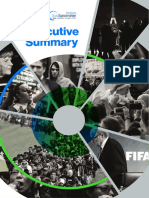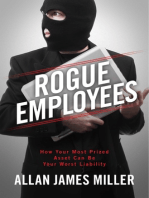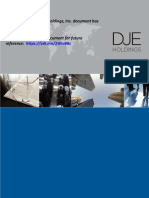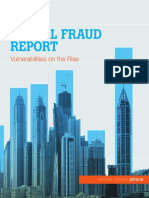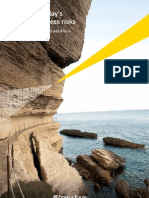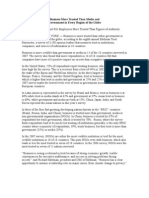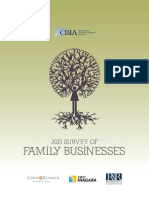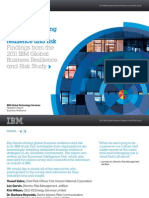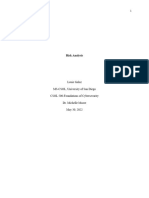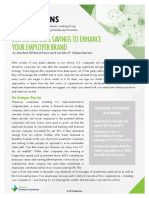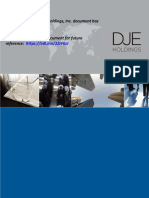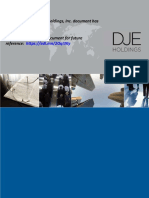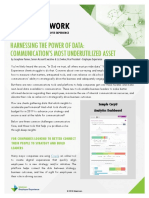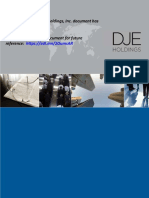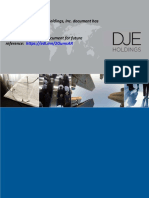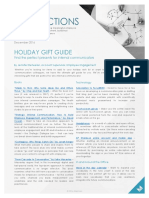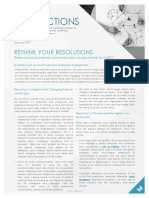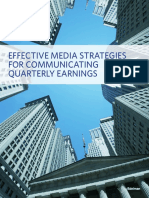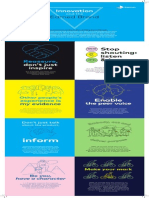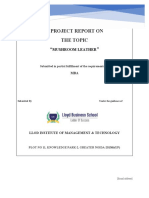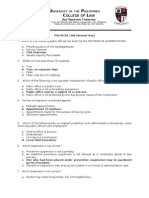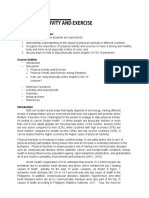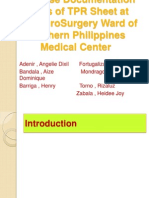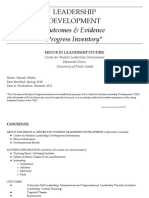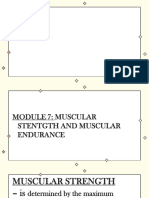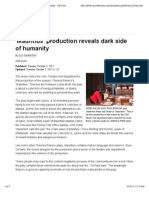10 Trust Barometer Insights
Uploaded by
Edelman10 Trust Barometer Insights
Uploaded by
EdelmanThe
Trust
10
01
Trust in
crisis
02
Globally, trust in the institutions
of business, media, government
and NGOs dropped three points
in 2017. Media is at all-time lows,
government trust continues to
erode, and two-thirds of surveyed
countries are now distrusters,
with under 50% trust.
03
A broken
system
Globally, there is now a 15-point
gap between the trust held by the
informed public and that held by
the mass populationa threepoint increase in the last year.
04
Failing system +
fears = action
06
Ten of the 28 surveyed countries
combine an above-average lack
of belief that the system is working
with multiple societal fearsthe
same hotspots of recent populist
actions: France, Italy, Mexico,
South Africa, Spain, Brazil,
Colombia, the U.K., Australia
and the U.S.
07
Peers highly
credible
Expectations for
business high
The three most important attributes
for building trust in a company are
treating employees well, offering
high-quality products and services,
and listening to customersand
they matter even more to those who
believe the system isnt working.
To explore the complete 2017 Edelman Trust Barometer,
visit www.edelman.com/trust2017
The media
echo chamber
People are nearly four times more
likely to ignore information that
supports a position they dont
believe in; dont regularly listen
to those with whom they often
disagree (53%); and are more
likely to believe search engines
(59%) over human editors (41%).
08
For the first time, a person like
yourself is as credible a source
for information about a company
as a technical or academic expert
(all three at 60%). Credibility of
CEOs is at an all-time low, with
a 12-point decline in the last year.
09
Concerns &
fears
Leading the list of societal
concerns and fears we measured
that are commonly associated with
populist actions are corruption
(69% concerned; 40% fearful);
globalization (62% concerned;
27% fearful); eroding social values
(56% concerned; 25% fearful);
immigration (55% concerned; 28%
fearful); and the pace of innovation
(51% concerned; 22% fearful).
Globally, 53% believe that the
system is not working for them
its unfair, doesnt give them hope
for the future and leaders wont
fix problems. 32% are uncertain,
and only 15% agree the system
is working.
05
Trust inequality
grows
Business adds
to fears
53% agree that the pace of change
in business and industry is too fast.
They worry about losing their jobs
due to lack of training or skills
(60%); foreign competitors (60%);
immigrants who work for less (58%);
jobs moving to cheaper markets
(55%); and automation (54%).
10
With the people
The trust crisis demands a new
operating model for organizations by
which they listen to all stakeholders;
provide context on the issues that
challenge their lives; engage in
dialogue with them; and tap
peers, especially employees,
to lead communications and
advocacy efforts.
All data is based on general population sample unless otherwise noted.
You might also like
- Solution Brief The Impact of Layoffs Employee Sentiment and Cost ImplicationsNo ratings yetSolution Brief The Impact of Layoffs Employee Sentiment and Cost Implications9 pages
- Executive Summary: 2012 Edelman Goodpurpose® Study100% (3)Executive Summary: 2012 Edelman Goodpurpose® Study8 pages
- 2017 Edelman Trust Barometer: Executive Summary98% (59)2017 Edelman Trust Barometer: Executive Summary20 pages
- 2016 Edelman Trust Barometer: Executive Summary90% (10)2016 Edelman Trust Barometer: Executive Summary20 pages
- Employee Engagement Insights From The Trust BarometerNo ratings yetEmployee Engagement Insights From The Trust Barometer3 pages
- Rogue Employees: How Your Most Prized Asset Can Be Your Worst LiabilityFrom EverandRogue Employees: How Your Most Prized Asset Can Be Your Worst LiabilityNo ratings yet
- Third Party Anti-Corruption Compliance CertificationNo ratings yetThird Party Anti-Corruption Compliance Certification1 page
- National Collegiate Athletic Association: Official Football SignalsNo ratings yetNational Collegiate Athletic Association: Official Football Signals1 page
- 2012 Edelman Trust Barometer: Executive Summary100% (4)2012 Edelman Trust Barometer: Executive Summary12 pages
- Executive Summary: 2013 Edelman Trust Barometer100% (5)Executive Summary: 2013 Edelman Trust Barometer12 pages
- 2015 Edelman Trust Barometer: Executive Summary100% (1)2015 Edelman Trust Barometer: Executive Summary12 pages
- Executive Summary: 2010 Edelman Goodpurpose® Study100% (1)Executive Summary: 2010 Edelman Goodpurpose® Study12 pages
- 2021 Edelman Trust Barometer Press ReleaseNo ratings yet2021 Edelman Trust Barometer Press Release3 pages
- Press Release: 2013 Edelman Trust BarometerNo ratings yetPress Release: 2013 Edelman Trust Barometer4 pages
- Aftermath of A Data Breach WP Final ReportNo ratings yetAftermath of A Data Breach WP Final Report25 pages
- Ernst-Young-2012 Global Information Security SurveyNo ratings yetErnst-Young-2012 Global Information Security Survey8 pages
- 2012 State of The Internal Audit Profession SurveyNo ratings yet2012 State of The Internal Audit Profession Survey44 pages
- The Costs, Causes and Consequences of Privacy RiskNo ratings yetThe Costs, Causes and Consequences of Privacy Risk5 pages
- Ey European Fraud Survey 2011 Final PDF 050611No ratings yetEy European Fraud Survey 2011 Final PDF 05061128 pages
- What GRC Will Look Like 2025 Compliance Next White PaperNo ratings yetWhat GRC Will Look Like 2025 Compliance Next White Paper6 pages
- Ey Badanie Naduzyc Gospodarczych 08052013No ratings yetEy Badanie Naduzyc Gospodarczych 0805201328 pages
- Economist Intelligence Unit - Silver Economy100% (1)Economist Intelligence Unit - Silver Economy29 pages
- Big Companies Are Embracing Analytics, But Most Still Don’t Have a Data-Driven CultureNo ratings yetBig Companies Are Embracing Analytics, But Most Still Don’t Have a Data-Driven Culture4 pages
- Business More Trusted Than Media and Government in Every Region of The GlobeNo ratings yetBusiness More Trusted Than Media and Government in Every Region of The Globe4 pages
- MarketPoint Whitepaper - The Skills Gap 2015 AugustNo ratings yetMarketPoint Whitepaper - The Skills Gap 2015 August9 pages
- What Are The Challenges Faced by Small Business Owners in This Era of Globalization100% (1)What Are The Challenges Faced by Small Business Owners in This Era of Globalization53 pages
- 2014 MillennialSurvey ExecutiveSummary FINALNo ratings yet2014 MillennialSurvey ExecutiveSummary FINAL15 pages
- Risk in Focus 2019: Hot Topics For Internal AuditorsNo ratings yetRisk in Focus 2019: Hot Topics For Internal Auditors43 pages
- DATAVERSITY Erwin State of Data Governance 2020 Final 012420No ratings yetDATAVERSITY Erwin State of Data Governance 2020 Final 01242016 pages
- 2012 Trust Barometer - Global Deck - 1-13ABTNo ratings yet2012 Trust Barometer - Global Deck - 1-13ABT25 pages
- Perspectives On Cybersecurity and Its Legal Implications: A 2015 Survey of Corporate ExecutivesNo ratings yetPerspectives On Cybersecurity and Its Legal Implications: A 2015 Survey of Corporate Executives12 pages
- Silver Tail Systems: 2012 Web Session Intelligence & Security Report: Business Logic Abuse EditionNo ratings yetSilver Tail Systems: 2012 Web Session Intelligence & Security Report: Business Logic Abuse Edition29 pages
- Building A Reputation Risk Management Capability100% (2)Building A Reputation Risk Management Capability20 pages
- Kaspersky Global IT Security Risks SurveyNo ratings yetKaspersky Global IT Security Risks Survey21 pages
- Use Tax Reform Savings To Enhance Your Employer BrandNo ratings yetUse Tax Reform Savings To Enhance Your Employer Brand3 pages
- Edelman Group Data Security and Privacy Policy For AffiliatesNo ratings yetEdelman Group Data Security and Privacy Policy For Affiliates1 page
- Why The Battle For Truth Is Also The Employer AdvantageNo ratings yetWhy The Battle For Truth Is Also The Employer Advantage3 pages
- DJE Human Resources Recruiting Privacy PolicyNo ratings yetDJE Human Resources Recruiting Privacy Policy1 page
- Gaining Recognition As A Best Place To Work50% (2)Gaining Recognition As A Best Place To Work3 pages
- Holiday Gift Guide: Find The Perfect Presents For Internal CommunicatorsNo ratings yetHoliday Gift Guide: Find The Perfect Presents For Internal Communicators2 pages
- Effective Media Strategies For Communicating Quarterly Earnings100% (2)Effective Media Strategies For Communicating Quarterly Earnings10 pages
- Innovation and The Earned Brand Executive Summary100% (1)Innovation and The Earned Brand Executive Summary2 pages
- A Project Report On The Topic " ": Mushroom LeatherNo ratings yetA Project Report On The Topic " ": Mushroom Leather18 pages
- The World of Otome Games Is Tough For Mobs 06No ratings yetThe World of Otome Games Is Tough For Mobs 06394 pages
- Chapter Two: 2. Budget Classification and ReformNo ratings yetChapter Two: 2. Budget Classification and Reform19 pages
- The Relationship Between Cell Phone Use and Academic Performance in A Sample of U.S. College StudentsNo ratings yetThe Relationship Between Cell Phone Use and Academic Performance in A Sample of U.S. College Students9 pages
- Overview of The Computing Paradigm: 1.1 Recent Trends in Distributed ComputingNo ratings yetOverview of The Computing Paradigm: 1.1 Recent Trends in Distributed Computing5 pages
- Updated - Group Assignment - (30 Sep 2024)No ratings yetUpdated - Group Assignment - (30 Sep 2024)4 pages
- LESSON 2 Physical Fitness and Self Testing ActivityNo ratings yetLESSON 2 Physical Fitness and Self Testing Activity26 pages
- Adenir, Angelie Dixil Fortugaliza, Ria Bandala, Aize Mondragon, Dominique Barriga, Henry Torno, Rizaluz Zabala, Heidee JoyNo ratings yetAdenir, Angelie Dixil Fortugaliza, Ria Bandala, Aize Mondragon, Dominique Barriga, Henry Torno, Rizaluz Zabala, Heidee Joy13 pages
- Strategies of Stem Students in Dealing With Their Academics With The Current Covid-19 PanNo ratings yetStrategies of Stem Students in Dealing With Their Academics With The Current Covid-19 Pan4 pages
- Applications in Ubiquitous Computing Raman Kumar 2024 Scribd Download100% (15)Applications in Ubiquitous Computing Raman Kumar 2024 Scribd Download48 pages
- Grade 5 - U1W1-L1 - A Life in The Woods - Vocab.No ratings yetGrade 5 - U1W1-L1 - A Life in The Woods - Vocab.26 pages
- Complete Download Physics Concepts and Connections textbook First Edition Igor PDF All Chapters100% (4)Complete Download Physics Concepts and Connections textbook First Edition Igor PDF All Chapters71 pages
- Module 7 Muscular Strength and EnduranceNo ratings yetModule 7 Muscular Strength and Endurance13 pages



